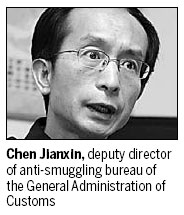Smuggling blights rare earths industry
Updated: 2012-12-10 07:53
By Zhang Yan and Wang Qian (China Daily)
|
||||||||

The smuggling of mineral resources out of China, especially rare earths, continues to increase, a senior official from the General Administration of Customs said.
The minerals are mainly smuggled to neighboring countries such as Japan and the Republic of Korea, Chen Jianxin, deputy director of the administration's anti-smuggling bureau, recently told China Daily.
Chen said the huge demand from foreign markets and China's high customs duties for rare earths are the main reasons behind the rise in smuggling.
He declined to disclose the latest statistics on the smuggling, but China's first white paper on the rare earths industry, released by the State Council in June, paints a grim picture.
The report said that in 2011, the amount of rare earths smuggled out of China was 20 percent higher than the amount of products that legally left the country.
According to customs, Chinay exported about 18,600 tons of rare earths products in 2011, accounting for 61 percent of the rare earths export quota of 30,184 metric tons released by the Ministry of Commerce for 2011.
At the same time, more than 21,000 tons were smuggled out, according to the report.
Of the estimated 21,000 tons, only eight cases involving 769 tons of the minerals were detected as part of a campaign to crack down on rare earths smuggling, according to customs.
China holds about 23 percent of the world's rare earths deposits, but accounts for more than 90 percent of the global supply. The term rare earths refers to 17 minerals that are used in high-tech devices such as batteries, wind turbines, cellphones and even missile guidance systems.
Chen said most smuggled rare earths come from Jiangxi province, the Inner Mongolia autonomous region and some coastal areas in South China, which are major rare earths production areas.
Besides Japan and the ROK, some rare earths products are transported to Hong Kong, a favored depot for smuggling materials out of the mainland, Chen said.
"The shortest waterway from Shenzhen to Hong Kong takes only five minutes, which makes Hong Kong an important transfer hub for legal and illegal business," said Wang Zhi, director of the anti-smuggling bureau in Shenzhen, South China's Guangdong province.
Although strict measures have been taken to crack down on rare earths smuggling, the situation has not improved.
Ma Rongzhang, secretary-general of the China Rare Earth Industry Association, said smuggling of the minerals continued to climb in the first half of the year, when thousands of tons were transported illegally.
He said the booming black market trade will boost illegal rare earths mining and damage China's rare earth policies.
China has adopted a series of measures to protect its rare earths reserves, including strengthening the supervision of the rare earths industry, raising taxes, allocating an export quota and building up the national strategic reserves.
According to the China Customs Statistics Information Center in Hong Kong, China's exports of rare earths from January to September reached a third of this year's export quota.
But all these measures have failed to help stabilize the price of rare earths, because smugglers charge about 30 percent less than the market price for the minerals, according to Ma.
A senior engineer from Baogang Group, the parent of Baotou Steel Rare Earth Hi-Tech Co, China's largest rare earths producer, said smuggling dragged down the export price.
"The smuggling is breaking the rules of fair trade and damaging the economic interests of both the government and legal companies," Wang said.
Chen said customs across the country will strengthen efforts against rare earths smuggling to guarantee the country's interests.
Contact the writers at zhangyan1@chinadaily.com.cn and wangqian@chinadaily.com.cn.
(China Daily 12/10/2012 page5)

 Relief reaches isolated village
Relief reaches isolated village
 Rainfall poses new threats to quake-hit region
Rainfall poses new threats to quake-hit region
 Funerals begin for Boston bombing victims
Funerals begin for Boston bombing victims
 Quake takeaway from China's Air Force
Quake takeaway from China's Air Force
 Obama celebrates young inventors at science fair
Obama celebrates young inventors at science fair
 Earth Day marked around the world
Earth Day marked around the world
 Volunteer team helping students find sense of normalcy
Volunteer team helping students find sense of normalcy
 Ethnic groups quick to join rescue efforts
Ethnic groups quick to join rescue efforts
Most Viewed
Editor's Picks

|

|

|

|

|

|
Today's Top News
Health new priority for quake zone
Xi meets US top military officer
Japan's boats driven out of Diaoyu
China mulls online shopping legislation
Bird flu death toll rises to 22
Putin appoints new ambassador to China
Japanese ships blocked from Diaoyu Islands
Inspired by Guan, more Chinese pick up golf
US Weekly

|

|






